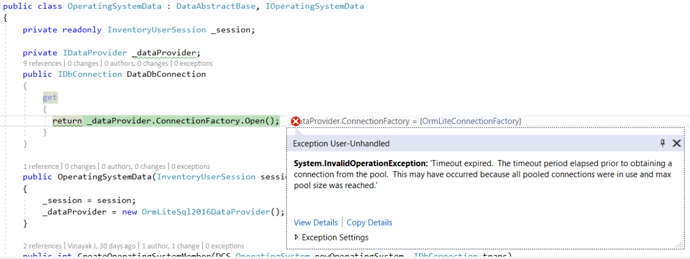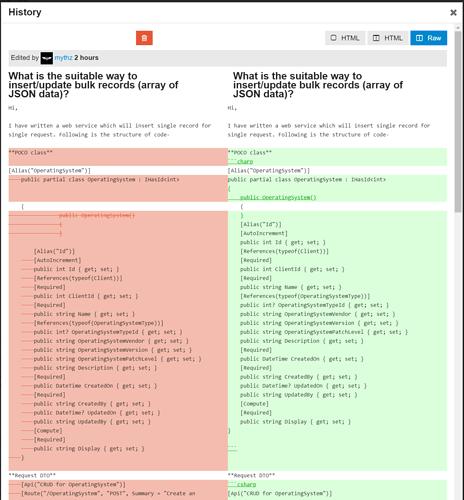Hi,
I have written a web service which will insert single record for single request. Following is the structure of code-
POCO class
[Alias("OperatingSystem")]
public partial class OperatingSystem : IHasId<int>
{
public OperatingSystem()
{
}
[Alias("Id")]
[AutoIncrement]
public int Id { get; set; }
[References(typeof(Client))]
[Required]
public int ClientId { get; set; }
[Required]
public string Name { get; set; }
[References(typeof(OperatingSystemType))]
public int? OperatingSystemTypeId { get; set; }
public string OperatingSystemVendor { get; set; }
public string OperatingSystemVersion { get; set; }
public string OperatingSystemPatchLevel { get; set; }
public string Description { get; set; }
[Required]
public DateTime CreatedOn { get; set; }
[Required]
public string CreatedBy { get; set; }
public DateTime? UpdatedOn { get; set; }
public string UpdatedBy { get; set; }
[Compute]
[Required]
public string Display { get; set; }
}
Request DTO
[Api("CRUD for OperatingSystem")]
[Route("/OperatingSystem", "POST", Summary = "Create an OperatingSystem")]
public class CreateOperatingSystemRequestDto : IReturn<CreateOperatingSystemRequestDtoResponse>
{
[ApiMember(IsRequired = true)]
public string Name { get; set; }
[ApiMember]
public int? OperatingSystemTypeId { get; set; }
[ApiMember]
public string OperatingSystemVendor { get; set; }
[ApiMember]
public string OperatingSystemVersion { get; set; }
[ApiMember]
public string OperatingSystemPatchLevel { get; set; }
[ApiMember]
public string Description { get; set; }
[IgnoreDataMember]
public bool Bulk { get; set; }
}
Response DTO-
public class CreateOperatingSystemRequestDtoResponse : IHasResponseStatus
{
public int Id { get; set; }
public ResponseStatus ResponseStatus { get; set; }
}
Service Interface
[Authenticate]
public sealed class OperatingSystemService : ServiceStack.Service
{
private readonly IOperatingSystemLogic _logic;
public OperatingSystemService()
{
_logic = new OperatingSystemLogic(this.SessionAs<InventoryUserSession>());
}
public CreateOperatingSystemRequestDtoResponse Post(CreateOperatingSystemRequestDto requestDto)
{
var result = new CreateOperatingSystemRequestDtoResponse();
var returnValue = _logic.CreateOperatingSystem(requestDto.ConvertTo<OperatingSystemModelBo>());
result.Id = returnValue;
result.ResponseStatus = returnValue > 0
? new ResponseStatus() { Message = "Operating System created successfully." }
: new ResponseStatus() { Message = "Operating System creation failed.", ErrorCode = "Create failed" };
return result;
}
public UpdateOperatingSystemRequestDtoResponse Put(UpdatOperatingSystemRequestDto request)
{
var result = new UpdateOperatingSystemRequestDtoResponse();
var returnValue = _logic.UpdateOperatingSystem(request.ConvertTo<OperatingSystemModelBo>());
result.ResponseStatus = returnValue == 1
? new ResponseStatus() { Message = "Operating System updated successfully." }
: new ResponseStatus() { Message = "Operating System update failed.", ErrorCode = "Update failed" };
return result;
}
public DeleteOperatingSystemResponseDto Delete(DeleteOperatingSystemRequestDto request)
{
var result = new DeleteOperatingSystemResponseDto();
var returnValue = _logic.DeleteOperatingSystem(request.OperatingSystemId, request.ForceDelete);
result.ResponseStatus = returnValue == 1
? new ResponseStatus() { Message = "Operating System deleted successfully." }
: new ResponseStatus() { Message = "Operating System delete failed.", ErrorCode = "Delete failed" };
return result;
}
}
And at Data layer, I am opening ormlite connection, do the transaction and then closing the connection.
This code structure works fine for single request.
Now, I wanted to leverage same code for bulk data. This bulk data will be in the form of array of object as input. Hence, I created wrapper on top of single request object like-
[Authenticate]
[Api("CRUD for bulk OperatingSystems")]
[Route("/OperatingSystemBulk", "POST", Summary = "Create bulk OperatingSystems")]
public class CreateOperatingSystemBulkRequestDto : List of CreateOperatingSystemRequestDto
{
}
Also, I have created a seperate servcie layer which will map single service like-
[Authenticate]
public sealed class OperatingSystemServiceBulk : Service
{
private readonly IOperatingSystemLogic _logic;
private OperatingSystemService _service;
public OperatingSystemServiceBulk()
{
_logic = new OperatingSystemLogic(this.SessionAs<InventoryUserSession>());
_service = new OperatingSystemService();
}
public CreateOperatingSystemBulkRequestDtoResponse Post(CreateOperatingSystemBulkRequestDto requestDtos)
{
var results = new CreateOperatingSystemBulkRequestDtoResponse();
requestDtos.ForEach(req => req.Bulk = true);
results.AddRange(requestDtos.Map(x => _service.Post(x)));
return results;
}
public UpdateOperatingSystemBulkRequestDtoResponse Put(UpdateOperatingSystemBulkRequestDto requests)
{
var results = new UpdateOperatingSystemBulkRequestDtoResponse();
requests.ForEach(req => req.Bulk = true);
results.AddRange(requests.Map(x => _service.Put(x)));
return results;
}
}
Following code will execute single service multiple times-
requestDtos.Map(x => _service.Post(x)
However, during execution it throws timeout exception for 25 rows of data-
Note - I was following - ‘Defining a Request DTO to accept a collection of Types’ from https://github.com/ServiceStack/ServiceStack/wiki/Auto-Batched-Requests.
Can you pls. suggest me solution to overcome this exception so that it works for 5k records ?
Thanks in Advance


